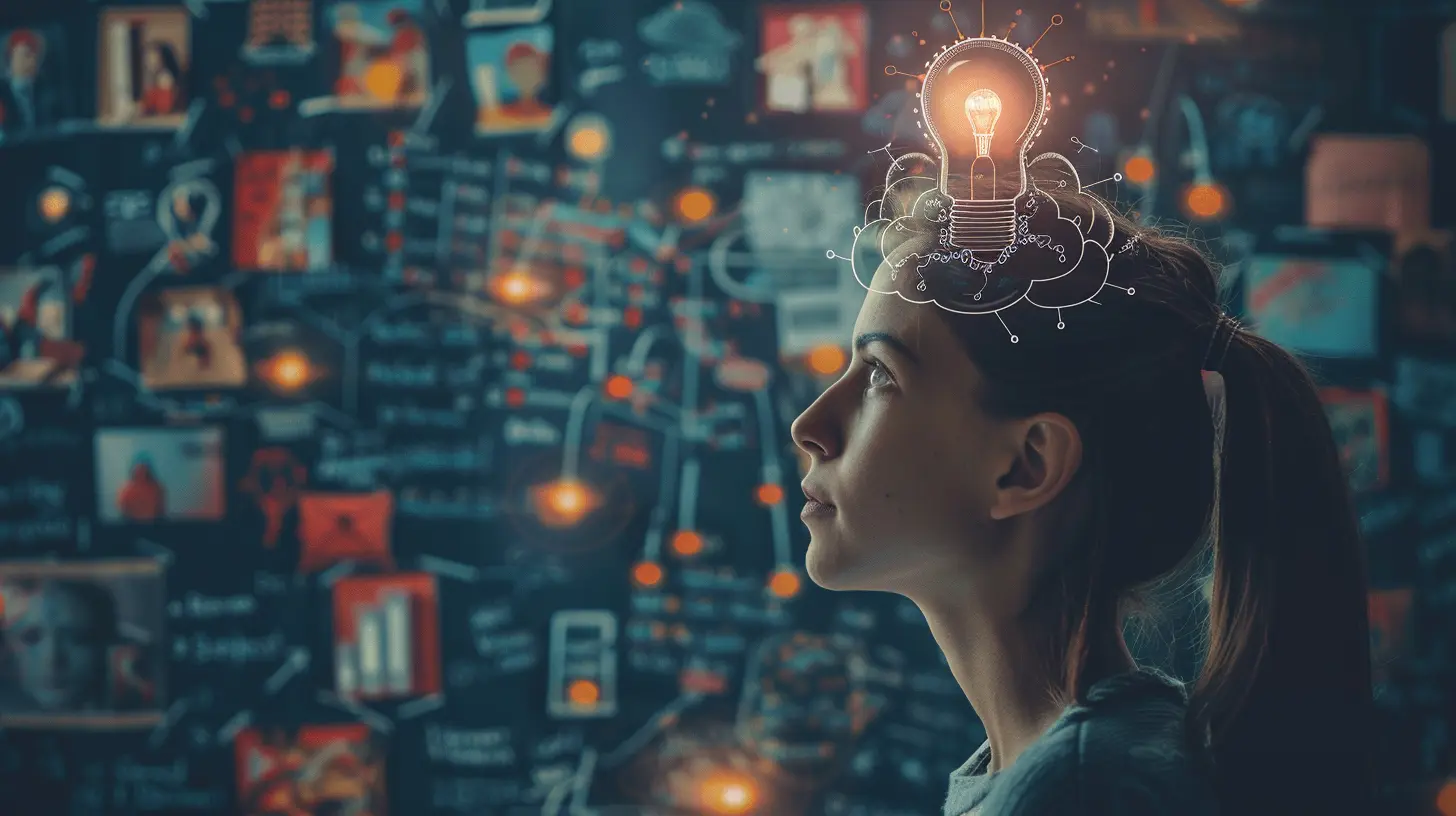Learning How to Learn: A Meta-Skill for Students
21 September 2025
Let’s be real for a second — school can feel like a never-ending race. You're juggling classes, assignments, exams, and a million tabs open in your brain all at once. But what if I told you there’s one skill, a sort of “superpower,” that could make all of that easier?
That superpower is learning how to learn. Yep, meta-learning — or learning about learning — is the ultimate game-changer. It’s the secret sauce successful students use to study smarter, not harder.

What Is Meta-Learning Anyway?
Picture this: You’re handed a toolbox on your first day of school. Traditionally, you're just told what to build (history facts, math formulas), not how to use the tools. Meta-learning is about finally learning how to handle that toolbox skillfully.In simple terms, it's the ability to understand how you learn best. It’s thinking about your thinking, which sounds a bit like being in one of those sci-fi mirrors that reflect into infinity — but hang in there.
Once you crack the code on how your brain absorbs, processes, and retains information, you’ll stop cramming the night before an exam and start studying in ways that actually work for you.

Why Learning How to Learn Matters (A Lot)
Let’s face it, traditional education often doesn't teach how to study; it just expects you to figure it out. That’s like being told to run a marathon without learning how to train.Here’s why this meta-skill is pure gold:
- It saves time. You’ll stop wasting hours using strategies that don’t work for your brain.
- It raises confidence. When you know how to learn, you're not second-guessing yourself every time you study.
- It sticks. You don’t just memorize — you actually understand and remember stuff for the long haul.
- It’s a career booster. This skill doesn’t vanish after graduation. You’ll use it in your job, hobbies, and literally any time you want to pick up something new.

The Science Behind Learning: Brain Stuff You Should Know
Now, we're not going full neuroscience lecture here, but a few basics can help.Neuroplasticity: Your Brain's Superpower
Your brain isn’t a fixed storage box. It changes — constantly. That’s neuroplasticity. The more you challenge it, the stronger and more flexible it becomes. Pretty cool, right?Every time you learn, your brain creates and strengthens neural pathways. The more often you recall or use that info, the smoother and faster those connections become.
Working Memory vs. Long-Term Memory
Think of your brain as having two inboxes:- Working memory is your short-term “scratchpad.” It's temporary and gets full fast.
- Long-term memory is where the magic happens — that's your library of knowledge.
The goal is to move info from working memory into long-term memory. How? Through spaced repetition, active recall, and — yep — learning how to learn.

Techniques That Make Learning Stick
Let’s break down some of the best strategies to actually improve your learning ability.1. Active Recall: Don’t Just Read, Retrieve
Reading your notes over and over isn’t studying — that’s passive. Your brain’s like, “Cool story, bro,” and forgets it two minutes later.Instead, test yourself. Cover the info and force your brain to retrieve it. Flashcards, practice quizzes, and even explaining it to someone else triggers active recall.
2. Spaced Repetition: Timing Is Everything
Ever crammed before a test only to forget everything the next day? That’s your brain dumping data because it wasn’t spaced out.Spaced repetition takes advantage of the “forgetting curve.” You review info at increasing intervals (day 1, day 3, day 7), just before you’re about to forget it. Apps like Anki or Quizlet are great for this.
3. Interleaving: Mix It Up
Instead of doing the same type of problem over and over, mix different types together. Your brain gets better at recognizing patterns and applying knowledge, not just memorizing answers.4. The Feynman Technique: Teach It
If you can’t explain a topic in simple terms, you probably don’t understand it well enough.Break it down. Teach the concept as if you’re talking to a 10-year-old. This forces you to clarify your thinking and identify gaps in your knowledge.
5. Dual Coding: Use Words + Visuals
Our brains love pictures. Combine text with diagrams, flowcharts, mind maps, or even doodles. Seeing the information from multiple angles helps cement it.6. Pomodoro Technique: Study Smart, Not Long
Burnout is real. Your brain isn’t built to concentrate for hours non-stop.Try this: 25 minutes of focused study, then a 5-minute break. After four “Pomodoros,” take a longer 15–30 minute break. You’ll be surprised how much more you can get done.
Know Your Learning Style (Sort Of…)
You might’ve heard of learning styles — visual, auditory, kinesthetic, etc. While science is still debating how valid these are, understanding your preferences can still be useful.Do you:
- Remember better by drawing diagrams or watching videos? Visual.
- Retain more when you hear and discuss? Auditory.
- Need to move around or do things hands-on? Kinesthetic.
Use this info to tweak your learning environment. Combine it with solid techniques like active recall, and boom — you’re unstoppable.
Mindset Matters: Believe You Can Learn
Here’s a truth bomb: mindset can make or break your learning.Growth vs. Fixed Mindset
A fixed mindset says, “I’m just bad at math.”A growth mindset says, “I’m not good at math yet, but I can improve.”
Guess which one leads to better results?
Psychologist Carol Dweck found that students who believe intelligence can grow actually learn more. They stay motivated, push through challenges, and don’t crumble after failure.
Embrace Mistakes
Mistakes aren’t the enemy — they’re how you learn. Every wrong answer is a step closer to the right one. The only real failure? Giving up.Your Learning Environment: Set Yourself Up for Success
Let’s talk setting.- Declutter your space. A messy desk equals a messy mind.
- Ditch distractions. Silence your phone. Use website blockers. Be ruthless.
- Get comfy (but not too comfy). You want focus, not nap time.
Also, music? Sure, as long as it doesn’t make you sing along instead of study. Lo-fi beats, instrumental, or ambient noise can help zone in.
Build Habits That Support Learning
Good habits make learning effortless. Here’s how to build them:Set Clear, Mini Goals
“Study physics” is vague. “Review Newton’s Laws for 25 minutes using flashcards” is clear and doable. Clarity = action.Use Triggers and Rewards
Attach your study session to a habit you already have.Example: After brushing your teeth in the evening, I’ll study for 25 minutes. Then reward yourself — a snack, a stretch, or guilt-free TikTok time.
Track Your Progress
Seeing your streak builds momentum. Use a habit tracker, planner, or even a sticky note chart. Small wins keep you going.Keep Learning Beyond School
This isn’t just about passing exams. Learning how to learn means you’ll adapt quickly no matter what life throws at you.New job? You’ll pick it up fast.
New skill? You’ll figure it out.
Suddenly interested in baking sourdough or writing a novel? Go for it.
When you own the skill of learning itself, the world becomes a giant buffet of knowledge. And you’ve got the appetite.
Final Thoughts
So, if you’ve ever felt overwhelmed by your studies, or like you're just not “getting it” — pause. Breathe. Then remember: learning how to learn is the first step. Once you’ve got that down, everything else gets easier.It’s not about being the smartest in the room. It’s about being the most adaptable. The one who’s not afraid to say, “I don’t know — yet.”
Now go out and train that brain like the mental Jedi you are.
all images in this post were generated using AI tools
Category:
Student SuccessAuthor:

Bethany Hudson
Discussion
rate this article
1 comments
Dash McCullough
Embrace the journey of learning how to learn! It's the key to unlocking your potential. You’ve got this!
October 2, 2025 at 11:55 AM

Bethany Hudson
Thank you! Embracing the journey of learning is indeed crucial for unlocking our potential. Your support is appreciated!


